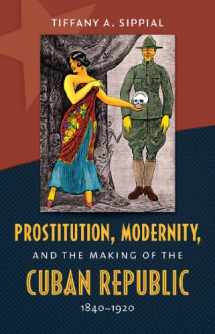
Prostitution, Modernity, and the Making of the Cuban Republic, 1840-1920 (Envisioning Cuba)
ISBN-13:
9781469608938
ISBN-10:
1469608936
Edition:
New edition
Author:
Tiffany A. Sippial
Publication date:
2013
Publisher:
University of North Carolina Press
Format:
Paperback
256 pages
Category:
Caribbean & West Indies
,
Women's Studies
,
Americas History
FREE US shipping
Book details
ISBN-13:
9781469608938
ISBN-10:
1469608936
Edition:
New edition
Author:
Tiffany A. Sippial
Publication date:
2013
Publisher:
University of North Carolina Press
Format:
Paperback
256 pages
Category:
Caribbean & West Indies
,
Women's Studies
,
Americas History
Summary
Prostitution, Modernity, and the Making of the Cuban Republic, 1840-1920 (Envisioning Cuba) (ISBN-13: 9781469608938 and ISBN-10: 1469608936), written by authors
Tiffany A. Sippial, was published by University of North Carolina Press in 2013.
With an overall rating of 4.2 stars, it's a notable title among other
Caribbean & West Indies
(Women's Studies, Americas History) books. You can easily purchase or rent Prostitution, Modernity, and the Making of the Cuban Republic, 1840-1920 (Envisioning Cuba) (Paperback) from BooksRun,
along with many other new and used
Caribbean & West Indies
books
and textbooks.
And, if you're looking to sell your copy, our current buyback offer is $0.89.
Description
Between 1840 and 1920, Cuba abolished slavery, fought two wars of independence, and was occupied by the United States before finally becoming an independent republic. Tiffany A. Sippial argues that during this tumultuous era, Cuba's struggle to define itself as a modern nation found focus in the social and sexual anxieties surrounding prostitution and its regulation. Sippial shows how prostitution became a prism through which Cuba's hopes and fears were refracted. Widespread debate about prostitution created a forum in which issues of public morality, urbanity, modernity, and national identity were discussed with consequences not only for the capital city of Havana but also for the entire Cuban nation. Republican social reformers ultimately recast Cuban prostitutes--and the island as a whole--as victims of colonial exploitation who could be saved only by a government committed to progressive reforms in line with other modernizing nations of the world. By 1913, Cuba had abolished the official regulation of prostitution, embracing a public health program that targeted the entire population, not just prostitutes. Sippial thus demonstrates the central role the debate about prostitution played in defining republican ideals in independent Cuba.


We would LOVE it if you could help us and other readers by reviewing the book
Book review

Congratulations! We have received your book review.
{user}
{createdAt}
by {truncated_author}


